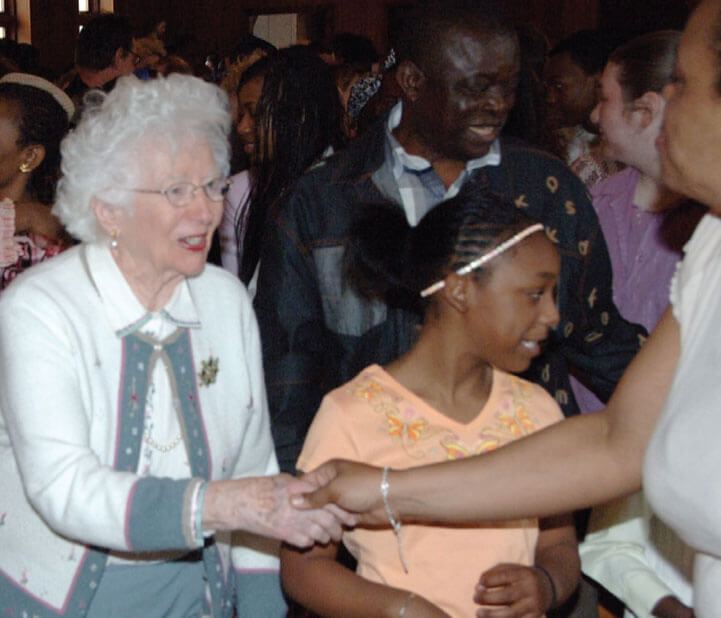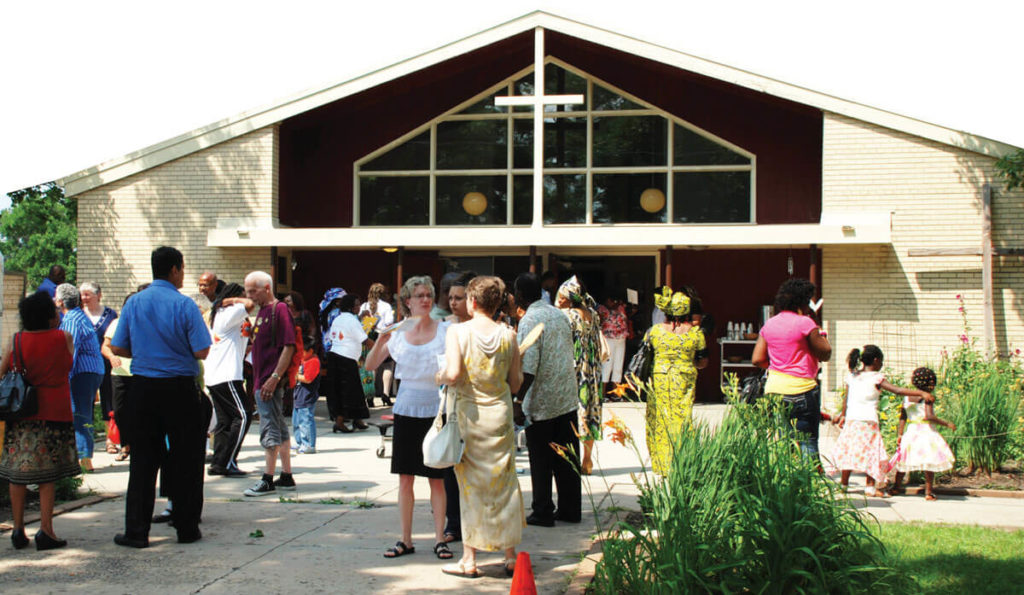
The community to which the risen Jesus appears has gathered in the evening of the first day of the week — Sunday. Jews celebrate Saturday as Sabbath, as a day of rest, worship, and re-creation. Saturday is the seventh day of creation, the day God rests from the work of the six days. For Christians Sunday is a new day, the day of Jesus’ resurrection and our new life in Christ, an eighth day of creation.
Jesus’ disciples lock the room where they have gathered. At least two among them believe Jesus has risen. Mary Magdalene may circulate, answering questions, retelling her encounter with Jesus. Those who fled at Jesus’ arrest may be kicking themselves and need reconciliation. Peter knows he is not the loyal friend and follower of Jesus he thought he was. Perhaps the community has locked the door to keep out not only those who put Jesus to death but also the mind-blowing news of Jesus’ resurrection.
Encounters with the divine always mix fear and fascination. Do the disciples fear those who put Jesus to death in the past, or do they fear the overwhelming amazement of a new creation, a divine surprise?
- What do you think Jesus’ friends fear most — the past with their failures or the future with its promise?
- When have you experienced a community locked in fear and in need of a visit from the risen Jesus? What might Jesus say?
Jesus appears in the midst of the community, extending peace. His wounds identify him as the same person who was crucified. The disciples rejoice.
Jesus extends peace to them a second time. He commissions them as a community to continue his mission — “As the Father has sent me, so I send you.”
As a third step, Jesus breathes on them. This is what God does in Genesis 2.7. God breathes life into the newly formed human, who becomes a living being. On Easter the Son of God breathes the creative, living Spirit of God upon the community. “Receive the Holy Spirit,” Jesus says. His gift empowers the disciples to become a reconciling community that forgives sins. “If you forgive people’s sins, they are forgiven them.”
The Bible translation Catholics hear at Mass has Jesus say next, “And whose sins you retain are retained.” This translation aligns Jesus’ words with those in Matthew’s gospel when he gives Peter the keys to the kingdom of heaven (16.19).
Bible scholar Sandra Schneider observes that the Greek word translated retained or bound more commonly means to hold fast, to embrace. She argues that Jesus is charging the community to hold fast the people they forgive. As a reconciling community, they are to embrace and support those they forgive, not to hold them bound to their sins. This is our call in continuing Jesus’ mission — to be the face of forgiveness and mercy among those in our lives.
John’s emphasis on the community is like the Second Vatican Council’s emphasis on the responsibility of the people of God. Pope Francis has reiterated the Council’s universal call to holiness. The whole Church community in all its members is the body of Christ in the world today.
Jesus entrusts us to one another’s care. We can strengthen bonds among us, and we can shred relationships. We can remember wrongs that have been righted. We can exclude those who trouble and test us. In his gift of peace to the original Christian community, Jesus insists that his followers have the power to build and hold together as a community.
- Who holds you fast?
- Who negotiates peace in your family and parish community?
- How do you use your power to speak and make peace? In what setting most often?

Thomas occupies center stage in the second half of Sunday’s gospel. Thomas’s doubt and subsequent faith parallel the mystery of how later generations of Christians grow into faith in Jesus’ death and resurrection. In the story Thomas touches Jesus’ hands, feet, and side for all of us who are not among the first witnesses.
In John 17.21 Jesus prays for all of us who will believe in him on the strength of his disciples’ word. We Christians of later generations have no option but believing on the word and witness of others. The generation for whom the fourth gospel was written had no choice either but to believe the witness of the community.
In every believer’s life, the community’s faith sometimes must carry the doubts of an individual. By including the story of Thomas’s doubt and faith, John’s community challenges itself to faith in Jesus’ presence and absence.
“Blessed are those who have not seen and have believed,” John writes (20.29). Thomas’s story challenges us, the people of God in our world today, to respond to the needs that we touch and that touch us. We experience Christ in these encounters. We can see in our world Christians at work making peace and sharing both the afflictions and joys of others.
We can recognize people among us who need shelter, are learning new languages, and rebuilding their lives after losing homes and livelihoods to war or fire or violence.
We can see the threat of driving while Black or getting sick while poor.
We can touch wounds that tell the cost of love for the world.
We can hear words of forgiveness that the community has received from the risen Christ, words that bear the power of the Spirit. Jesus sends us as the Father sent him (John 20.21).
- What wounds do groups in your parish or neighborhood tend? What wounds touch you that you might help others see and join in care?
- How does the story of Thomas coming to faith resemble your own journey?
